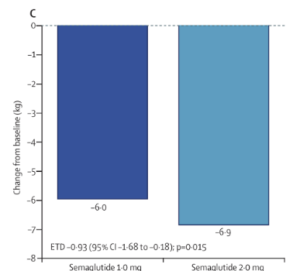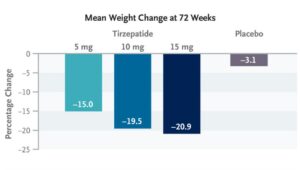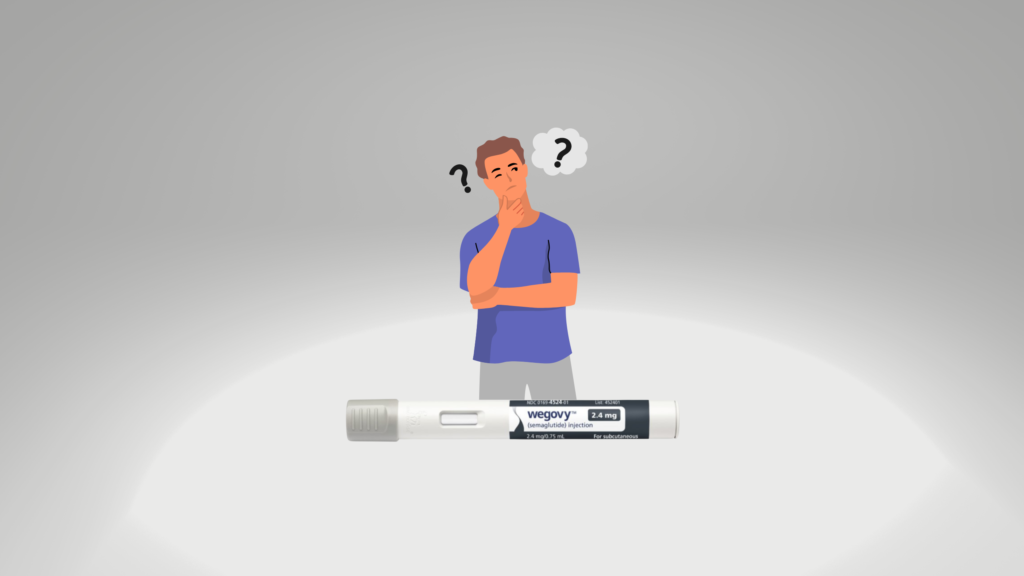The following is a transcript of the “High Dose Wegovy” video posted on YouTube.
—
Why can’t I take a higher-than-prescribed dose of my Wegovy or Mounjaro prescription? I mean, some has been working very well for me, so why can’t I take more and get even more benefit? I mean, some is good, and more is better, right?
This is a pretty common question that I’ve been getting. So I figured we’d better jump on here to answer it for you and give you the breakdown as to whether taking a higher dose of Wegovy or Mounjaro actually can provide you additional benefit and taking a dose beyond what is the recommended maximum doses currently isn’t going to provide more results.
Let’s get into it!
—
So if you’re currently taking Wegovy 2.4mg once per week, or maybe Mounjaro 15 mg once per week, and you’ve gotten pretty good results. Maybe you’ve reached a plateau, or maybe you would like results to happen even faster; well, does that mean that you could take an even higher dose and get better results?

This is a great question and definitely warrants an answer. To get to the short and the sweet of it is that, beyond
the maximum dosages we currently have for Wegovy and Mounjaro, the answer would be no. No, I do not recommend taking a higher dose. Neither would really any clinician out there with any good sense about them. In this situation, more really isn’t better; and as with most things more can actually lead to a greater amount of harm.
The Body’s Regulation
When it comes to the medications, we’ve got a couple of other things that we need to take into account that will not provide us that additional benefit that we’re seeking. So when it comes to medications and the human body, in general, the body is a very tightly regulated system. It has a number of checks and balances in place to ensure that no chemical process or reaction gets too out of hand and potentially harms you, the organism.
When it comes to medications, there are a couple of examples here where say, some medications, when you take them, your body needs to use an enzyme to break it down to get the active ingredient, where your body only has so many receptors that a medication can bind to then exert and give the effect that we’re looking for.
Limits of Enzymes and Receptors
And so, if we have a limited number of enzymes, a limited number of receptors, well, if you pump in a certain amount of medication, eventually, you’re going to reach a point where you’re going to saturate all of those enzymes and all of those receptors. So, you can pump in more medication and do it all day long, but ultimately, you won’t get more effect or benefit because the enzymes and the receptors are all saturated. The drug is literally just going to be sitting in your system, twiddling its thumbs.
 It’s like driving down a four-lane highway; everything’s great, everybody’s going to work, we’re all flying along just fine. And, of course, it’s a beautiful sunny day; there’s nothing in your eyes, no distractions, the pavement’s completely dry, and somehow someone still gets into an accident. And suddenly, that four-lane highway gets diverted down to a single lane. So, it doesn’t matter how many cars we got coming up behind us on this highway if all of a sudden we’ve got to diverge down into this single lane and only one car is allowed to pass at a time. Well, only that one car will get through, no matter how many cars are backed up behind us. That is the exact same situation with medications. You can pump more in, but you’re not going to get that benefit, and I will show you a little bit of data here to prove my point.
It’s like driving down a four-lane highway; everything’s great, everybody’s going to work, we’re all flying along just fine. And, of course, it’s a beautiful sunny day; there’s nothing in your eyes, no distractions, the pavement’s completely dry, and somehow someone still gets into an accident. And suddenly, that four-lane highway gets diverted down to a single lane. So, it doesn’t matter how many cars we got coming up behind us on this highway if all of a sudden we’ve got to diverge down into this single lane and only one car is allowed to pass at a time. Well, only that one car will get through, no matter how many cars are backed up behind us. That is the exact same situation with medications. You can pump more in, but you’re not going to get that benefit, and I will show you a little bit of data here to prove my point.
Sustain Forte Trial
So our first example is going to come from the Sustain Forte trial, which was a trial that compared Semaglutide, which is the drug that’s found in Wegovy and Ozempic, 1 mg once per week, to Semaglutide 2 mg once per week.

As you can see here in this little bar graph, in the dark blue, we have the Semaglutide 1 mg dose, and in the turquoisey kind of colour, we’ve got the Semaglutide 2 mg dose.
And as you can see, in the dark blue, that Semaglutide dose led to a weight loss from a baseline of about six kilograms or just over 12 pounds. The 2 mg dose led to a weight loss of 6.9 kilograms. Looking at the differences between those two doses, we have 6 and 6.9; we only have a 0.9 kilogram difference between the two dosages. As you can see, we literally doubled the dose of Semaglutide, and we only got an extra 0.9 kilogram loss from baseline.
So yes, there is a difference, but we’re not doubling the benefit of these medications. In fact, the benefit that you’re getting is quite minimal overall when you start increasing that dose. So as you can see, even though we doubled the dose of the medication, we only got a little bit of extra benefit. We didn’t get double the result in terms of weight loss; we didn’t go from six kilos up to 12 kilos being lost.
Surmount-1 Trial
To further highlight this point, I want to show you the data from the Surmount-1 trial. In the Surmount-1 trial, they looked at Mounjaro or Trizepatide, a 5, 10, and 15 mg dose. They looked at the participants over a period of time and how much weight they lost, and as you can see here with the 5 mg dose, the percent loss from baseline was 15%. Then, in the 10 mg dose, the percent loss from baseline was 19.5%, and then in the 15 mg dose at the end there, the loss was 20.9%. So, going from the 5 mg to the 10 mg dose, we went from 15 to nearly 20%, not too bad, 5 mg to 15 mg, again, a 5% further decrease in baseline weight.

However, going from that 10 to that 15 mg dose, there wasn’t much of a difference. You can see here that as the dose goes up, the benefits begin to decrease, or the amount of benefit you’re getting per dose will not be equivalent to the increase in the dose you’re putting in. In fact, the difference between that 10 and 15 mg dose of Trizepatide, do you need to go up to that 15 mg dose?
I mean, maybe, you might get a little extra, but if you can’t tolerate that dose, there’s no need to go up to it. You could stay at that 10 mg dose and get essentially the same results. And this is one of the things that I really want to highlight with these new, more powerful medications that are coming out is that we’re really trying to customize an individual’s dosage. We don’t need to push everybody to that top dose anymore; we can just find the dose that ultimately works for them, that they can tolerate because you’re still going to get a ton of benefit from a lower dose; you don’t need to go to that higher dose to get maybe a pound or two more of weight loss.
Diminishing Returns
 Further, as you can see that if we were to go past that 15 mg dose of Trizepatide or past the 2.4 mg once the per-week dose of Wegovy, really the benefits that you’re going to see are going to get less and less and less, until eventually, it’s all just going to even out, and you’re not going to get any further benefit whatsoever. All you’re probably going to get is harm because, unfortunately, when it comes to the side effects, and we dump more medications in, well, the side effect receptor side of things tends to be a lot more willing to take on more drug and cause a whole lot of problems for you. You’ll have the harm of having to pay for more of these drugs out of pocket.
Further, as you can see that if we were to go past that 15 mg dose of Trizepatide or past the 2.4 mg once the per-week dose of Wegovy, really the benefits that you’re going to see are going to get less and less and less, until eventually, it’s all just going to even out, and you’re not going to get any further benefit whatsoever. All you’re probably going to get is harm because, unfortunately, when it comes to the side effects, and we dump more medications in, well, the side effect receptor side of things tends to be a lot more willing to take on more drug and cause a whole lot of problems for you. You’ll have the harm of having to pay for more of these drugs out of pocket.
So taking more medication does not always mean it will be better, and I definitely don’t recommend it in this situation. We’ve got the data to show that going much higher will not provide any more benefit for you if you are at the max dose of Mounjaro or Wegovy. You’re not losing weight, or you feel like you’re not losing weight fast enough; well, we need to discuss a couple of other things here.
Healthy Weight Loss Approach
 The first one being, if you’re not losing weight, well, you’re not currently in a deficit, so you need to take a look at your lifestyle, maybe start tracking your calories, actually, take a look at what you’re doing and what you’re eating on a day-to-day basis and start to make some changes there, because ultimately, that’s going to be what drives and leads to the weight loss. If you want to lose that last 10 pounds or feel like you’re not losing weight quickly enough, I think you need to look at your priorities and ask yourself, why?
The first one being, if you’re not losing weight, well, you’re not currently in a deficit, so you need to take a look at your lifestyle, maybe start tracking your calories, actually, take a look at what you’re doing and what you’re eating on a day-to-day basis and start to make some changes there, because ultimately, that’s going to be what drives and leads to the weight loss. If you want to lose that last 10 pounds or feel like you’re not losing weight quickly enough, I think you need to look at your priorities and ask yourself, why?
Why do I need to lose that 10 pounds, or why do I need to lose weight faster? What’s the desperation? What are we trying to achieve here? When we lose that 10 pounds, will we be a completely different person? Or will you be different if you lose five pounds per week versus one pound per week, which is healthy and standard? Are you going to achieve something? Like, what exactly is it that we are striving for?
Finding Motivation and Reasons for Weight Loss
 And I would argue, in my clinical experience, the people that are really stuck on trying to lose that last 10 pounds or trying to lose weight as quickly as possible tend to be the ones that are ultimately going to relapse and regain most of that weight back. And that’s because they’re doing it for the wrong reasons. They’re not doing it for health and trying to improve their health so they can keep up with their kids or their grandkids or so that they can feel better and be able to go hiking and be more mobile or whatever like that; they’re tending to do it because they’re trying to do it for society or somebody else and not for them themselves. So definitely a couple of things to keep in mind, you beautiful people.
And I would argue, in my clinical experience, the people that are really stuck on trying to lose that last 10 pounds or trying to lose weight as quickly as possible tend to be the ones that are ultimately going to relapse and regain most of that weight back. And that’s because they’re doing it for the wrong reasons. They’re not doing it for health and trying to improve their health so they can keep up with their kids or their grandkids or so that they can feel better and be able to go hiking and be more mobile or whatever like that; they’re tending to do it because they’re trying to do it for society or somebody else and not for them themselves. So definitely a couple of things to keep in mind, you beautiful people.
 Overall, do not go beyond the prescribed dose of the medications you have been given. There is no point in doing it; as I said, it will likely lead to more harm. A majority, all the things in life, yes, to a certain degree, are good, and in some situations, more can be better, such as exercise. However, there will still be a point where there can be too much. And so, again, sustainability and consistency are the keys, and living your absolute best life overall. That is all for today, you beautiful people.
Overall, do not go beyond the prescribed dose of the medications you have been given. There is no point in doing it; as I said, it will likely lead to more harm. A majority, all the things in life, yes, to a certain degree, are good, and in some situations, more can be better, such as exercise. However, there will still be a point where there can be too much. And so, again, sustainability and consistency are the keys, and living your absolute best life overall. That is all for today, you beautiful people.
As always, don’t forget to hit that Subscribe button down below so you don’t miss out on another episode, and check me out on my other channels, @TheOfficialDrDan, and check out my websites, healthevolved.co and apothecarerx.ca, and come down and check out my pharmacy in Calgary, Alberta, Canada, where you can book a consultation with myself or my team for a weight management consultation and workup to see if we can help and support you on your weight management journey.
Until next time, you beautiful people, always remember that small tweaks lead to massive peaks.
References:
The New England Journal of Medicine, July 21, 2022. Tirzepatide Once Weekly for the Treatment of Obesity. Retrieved from: https://www.nejm.org/doi/full/10.1056/NEJMoa2206038 and https://pubmed.ncbi.nlm.nih.gov/35658024/.
—
 Dr. Dan
Dr. Dan
Follow me on social media for regular updates – @TheOfficialDrDan
Subscribe to my newsletter for a heads-up on all new content.
Sharing is caring! Here’s the link for social, email, and even text – https://healthevolved.co/protein-protein
If you need some coaching support on your weight management journey, you can book a consultation with me to see if you’d be a good fit for our program.
Questions or comments? Please send them my way on our Contact Us page!






